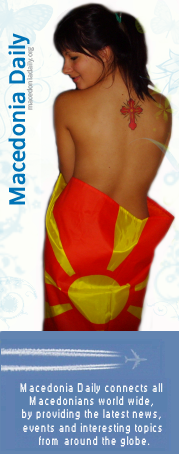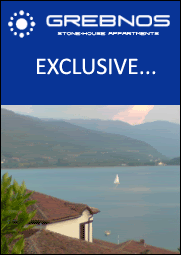VMRO ASKING CRVENKOVSKI NOT TO DO FAVORS FOR GREECE

National.
The Macedonian ruling party coalition in a press conference stated there is no need to hear an official opinion out of Athens, because their opinions are first expressed/mirrored by Branko Crvenkovski.
The World Macedonian Congress went a step further, asking for Crvenkovski and his 'cronnies Zaev, Frckovski be put on trial for treason'.
VMRO DPMNE appealed to President Crvenkovski, NSDP leader Petkovski and former FM and Interior Minister Frckoski to refrain from statements that could harm Macedonia’s position.
The party assessed that the standpoints they have presented so far are in favour of Greece. “These gentlemen have been directly involved in the name dispute with Greece for 17 years. We appeal to Branko Crvenkovski, Tito Petkovski and Ljubomir Frckovski to at least not hamper Macedonia if they cannot aid the country.
All of their statements can be used against Macedonia in this court process. We urge them to assume pro-Macedonian positions instead of pro-Greek stands,” said Koce Trajanovski from VMRO-DPMNE.

Branko Crvenkovski: Tied to Greece before 1991, with uninterrupted ties to this day. Crvenkovski and Gligorov were not present in Macedonia during the referendum. They were publicly against independent Macedonia. Both skipped the referendum vote and left the country, spotted in Solun. Ironically, both ended up being president, via fraudulent elections. Crvenkovski to this day remains publicly Anti-Macedonian.

Tito Petkovski: Not known whether he holds a Greek citizenship. He is entitled to one. His two daughters are married into the Greek Oligarchy, both hold Greek citizenships. His in-laws from Athens own the largest ice cream distributor company in the Balkans. The NSDP party is funded by the Athens Co. At the moment, NSDP enjoys 0.1% popularity in Macedonia. His pro-Greece views are expected.

Ljubomir Frckovski: Former Interior Minister, closely tied to Branko Crvenkovski. During Kiro Gligoro's assassination attempt, Frckovski was the MoI, while Crvenkovski was Prime Minister. Continues to be the only individual from Macedonia invited as a "Historian" at various Greek Universities where he explains his pro-Greece stances. Frckovski is a law professor in Skopje, has no background in History.
[Mina]


























FROM 'AMERICAN CHRONICLE'
The Basic Narrative of Pseudomacedonian Ideology
Vasko Gligorijevic
November 21, 2008
The Macedonian Issue is one of most significant and yet least understood cultural conflicts in modern Europe. It involves concepts which differentiate it from being a classic geopolitical crisis, many of which are easily, if not completely, explained by their economical aspects coupled with the archaic, recurring themes of expansion as augmentation of the assertive side's space and resources. The Macedonian Issue of modern type demands other approaches towards rational its understanding. In brief, the conflict emerged from the dissolution of Yugoslavia in early 1990's when the young Balkan nation which gained recognition in the United Nations as Former Yugoslav Republic of Macedonia challenged the integrity of neighboring Greece. This is a continuous pattern of behavior practiced not via direct, military confrontation or hostile action in terms of economic and other forms of pressure but through attempts at creating fake historical narratives as a reason d' etre of the entire social life within FYROM. This mentality is also evident in a more pronounced manner within the Slavic part of its diaspora (it should be noted that while "Slavic" correctly designates the ancestry and the language of FYROMian, all affinity towards Slav ethnic heritage as well as self-recognition as a part of the Slavic group of peoples are almost completely extinguished).
The basic concepts of the Pseudomacedonian irredentism may be reduced to following political and cultural policies:
1. The "Macedonian" people have unbroken cultural lineage with Ancient Macedonians, a Paleobalkan group whose Hellenic ethnocultural quality is zealously denied, which came into worldwide prominence in the era of Phillip II and Alexander III with creation of the first truly global empire. This idea had no precedent in the cultural and education policy of Yugoslav federation from 1944 to 1991 which favored Slavic ethnogenetic narrative, although within the a historiographic context based on communist ideology, 19th and 20th century military and economic history was favored. In today's FYROM, the hardline advocates of this idea surpassed the "fusionist" theory according to which Slavs "took the torch" by obtaining the ethnic name and folklorist traits from the Ancient Macedonians. Indeed, one has to wonder, if Slavs truly amalgamated with the Macedonian population (which was, 900 years after Alexander, completely homogenized regarding the language, identity and way of life under high Byzantine culture of Greek type). Any erudite observer of this ethnogenetic theory is left to wonder: "if such ethnic fusion occurred, how came that neither Bizantine contemporaries registered the process, nor the presence of a new, "Macedonian" ethnic group, north of one of greatest political, economic and cultural centers of the Empire, Thessaloníki"?
How come that such "Macedonian" ethnic groups failed to instill itself in the memory of peoples from surrounding ethnic groups prior to the XXth century? All this given the fact that the areal of Slavic people of FYROM until quite recently in terms of Balkan history overlapped with all of its neighbors which had no reasons not to include "Macedonians" into the corpus of their documents and literary works if there was such population with which they would obviously have interaced.
The silence of history regarding the existence of a "Macedonian" group of Slavic-speakers in their alleged formative years speaks volumes. Consequently, the narrative in which leaps are made from ancient history of the neighboring Greek region to 19th century speculations of the first Protomacedonists is a prevailing form of contribution to the identity discourse.
2. The second point, with quite recent origin, on which the Pseudomacedonian historiography is based, is that the migration of Slavs, an event from 6th and 7th century CE attested by history and archeology as well as th evident linguistic Slavization of the geographical names throughout most of the Balkan peninsula, never took place. Instead, Pseudomacedonian historians claim that "Slavic migration" was actually a fabrication from Communist Moscow and Belgrade designed to keep the least developed Yugoslav republic in a political status quo. The persistent urban myth that the Yugoslav regime "forbade" archaeological and historiographic research of Ancient Macedonia is easily refuted by simple bibliographic research.
The inability by Pseudomacedonian thinkers to explain the existence of other Slavic nations which use languages that have a great degree of mutual intelligibility with standard FYROMian forced them to invent bizarre theses: one of them holds a position that Slavs are descendants of deserters from the Macedonian army in Alexander's time, another theory states that a wholesale conversion of Slavs to "Macedonian" language as a result of Cyrilo-Methodian and other missions took place, then there is a theory postulating genesis of Slavic-speaking areas in situ and so on. Once a result of spare-time activity by extremist elements of the diaspora, its status changed with the proclamation during the recent ordination of FYROM's top prize for scholarship, the "23. October" awards, that today's language of Slavs in that state has Ancient Macedonian language as its ancestral form. Such stance became official with this act and will determine the future allocation of human and material resources in the relevant scholarly disciplines. Undoubtedly, such regressive, anti-scientific attitude will lead to further deterioration of the already minuscule credibility of entire culture-contemplating intelligentsia in FYROM.
What would be in another context just an exercise in quasimythological ramblings by small and marginal group of sensationalist authors, a genre belonging to the counter-cultural movements which are to a certain degree found everywhere, since 1992 became a dogmatic credo, criticism of which is halted by the oppressive social conditions prevalent in VMRO-DPMNE's FYROM. Needless to say these theories were never considered as a welcome alternative to the current state of knowledge in relevant peer-reviewed journals outside FYROM, let alone taken as plausible. The decisive action undertaken by the ruling political party regarding the propagation and subsidizing the process of building identity framework via manipulation of history, public education and creation of symbols caused understandable reactions in Greece. These are in turn locally articulated in the progovernmental media as displays of Greek extremism against which only a rightist, "defiant" political option can provide consolidation.
What has been until quite recently only a relatively lucrative niche business, by a small number of amateur authors without any relevant education, slowly rises as a trend designated to impose itself as a pattern of self-legitimation. The Cominterne-created ethnocentric, national-communistic model could have been liquidated in the first years of independence of FYROM and replaced with restitution of the traditional and well-attested Bulgarian, as well as Serbian identities. Instead, it became a developed, robust system of popular self-identification. Being upgraded from the methodologically flawed explanation of cultural development by Titoist theoreticians, the ideology of Pseudomacedonism became a secular religion based on blind faith. Its defeat will not depend just on diplomatic pressures from abroad but on energetic confrontation from inside based on might of the facts and plausible opinions formed in accordance with them.
Posted by Anonymous |
22:44
Anonymous |
22:44
Yes VMRO!GO!!!!!!
If you want to learn Macedonian visit my blog:
http://learnmacedonian.blogspot.com/
Posted by M |
23:09
M |
23:09
Most of the themes written in this "American Chronicle" can be applied for the modern Greek Hellenism !
You are both (MK and GR) crazy 10 years old brothers fighting for a lost toy.
Wake up and work for your future and not for your past.
Posted by Cyrano |
15:00
Cyrano |
15:00
Karolina Goceva the 2007 F.YUG.R.O.M representative in Eurovision, took a bulgarian passport, declares herself as Bulgarian and today lives in Bulgaria...
Aha... the bulgarian list of former yugoslavian rebublic is getting bigger every day...
Posted by Anonymous |
00:08
Anonymous |
00:08
This is a little harsh. Just because Crvenkovski isn't overly nationalistic, doesn't mean he supports Greece. That is just bullshit. People should be praising him for not being so stuborn and actually realizing that a name change is necessary if Macedonia wishes to exist in the future.
Posted by Anonymous |
06:12
Anonymous |
06:12
Post a Comment